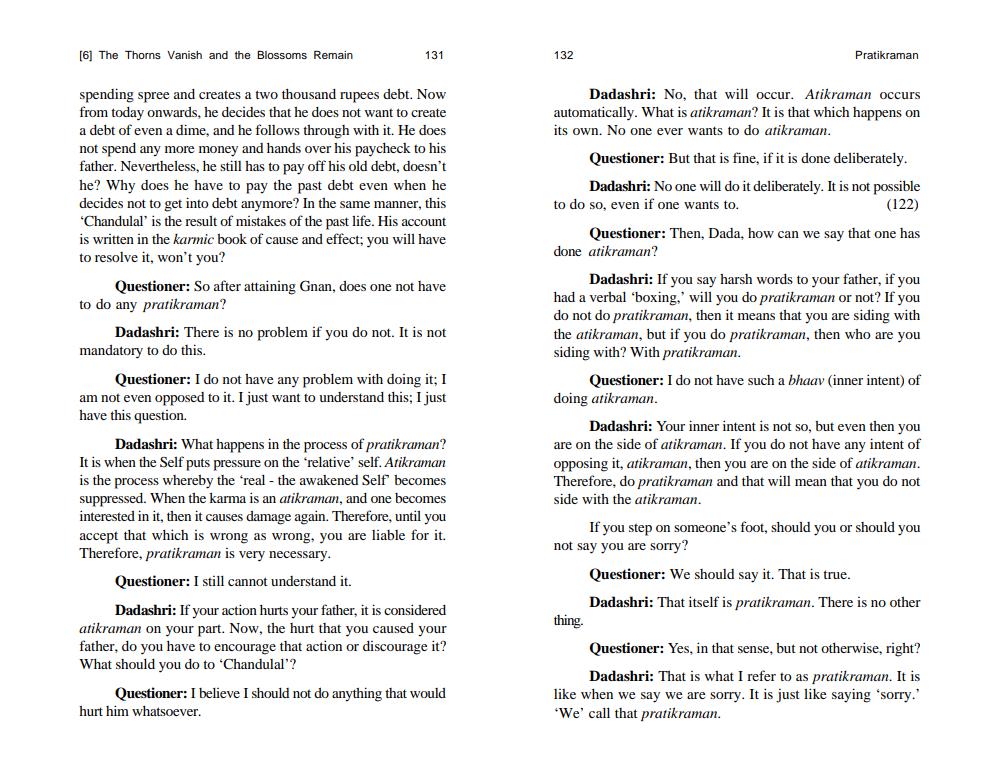________________
[6] The Thorns Vanish and the Blossoms Remain
131
spending spree and creates a two thousand rupees debt. Now from today onwards, he decides that he does not want to create a debt of even a dime, and he follows through with it. He does not spend any more money and hands over his paycheck to his father. Nevertheless, he still has to pay off his old debt, doesn't he? Why does he have to pay the past debt even when he decides not to get into debt anymore? In the same manner, this 'Chandulal' is the result of mistakes of the past life. His account is written in the karmic book of cause and effect; you will have to resolve it, won't you?
Questioner: So after attaining Gnan, does one not have to do any pratikraman?
Dadashri: There is no problem if you do not. It is not mandatory to do this.
Questioner: I do not have any problem with doing it; I am not even opposed to it. I just want to understand this; I just have this question.
Dadashri: What happens in the process of pratikraman? It is when the Self puts pressure on the 'relative' self. Atikraman is the process whereby the 'real - the awakened Self becomes suppressed. When the karma is an atikraman, and one becomes interested in it, then it causes damage again. Therefore, until you accept that which is wrong as wrong, you are liable for it. Therefore, pratikraman is very necessary.
Questioner: I still cannot understand it.
Dadashri: If your action hurts your father, it is considered atikraman on your part. Now, the hurt that you caused your father, do you have to encourage that action or discourage it? What should you do to 'Chandulal'?
Questioner: I believe I should not do anything that would hurt him whatsoever.
132
Pratikraman
Dadashri: No, that will occur. Atikraman occurs automatically. What is atikraman? It is that which happens on its own. No one ever wants to do atikraman.
Questioner: But that is fine, if it is done deliberately. Dadashri: No one will do it deliberately. It is not possible to do so, even if one wants to. (122) Questioner: Then, Dada, how can we say that one has done atikraman?
Dadashri: If you say harsh words to your father, if you had a verbal 'boxing,' will you do pratikraman or not? If you do not do pratikraman, then it means that you are siding with the atikraman, but if you do pratikraman, then who are you siding with? With pratikraman.
Questioner: I do not have such a bhaav (inner intent) of doing atikraman.
Dadashri: Your inner intent is not so, but even then you are on the side of atikraman. If you do not have any intent of opposing it, atikraman, then you are on the side of atikraman. Therefore, do pratikraman and that will mean that you do not side with the atikraman.
If you step on someone's foot, should you or should you not say you are sorry?
thing.
Questioner: We should say it. That is true.
Dadashri: That itself is pratikraman. There is no other
Questioner: Yes, in that sense, but not otherwise, right?
Dadashri: That is what I refer to as pratikraman. It is like when we say we are sorry. It is just like saying 'sorry.' 'We' call that pratikraman.




